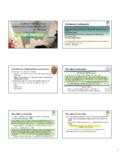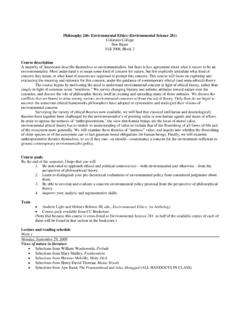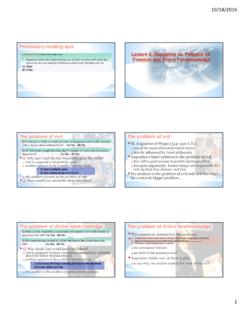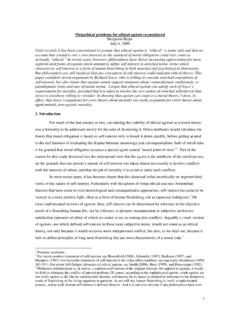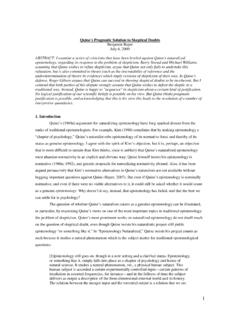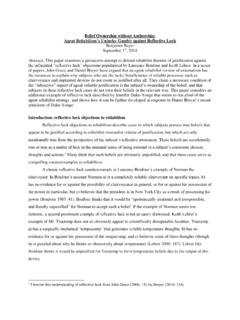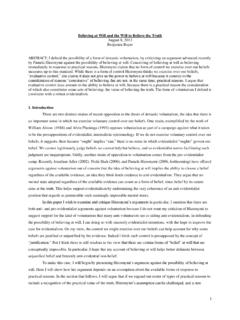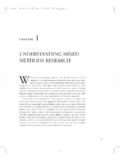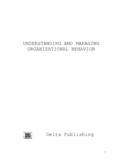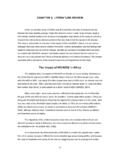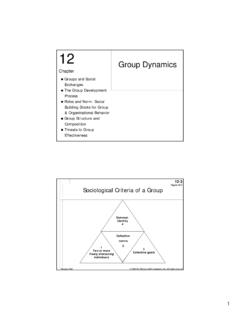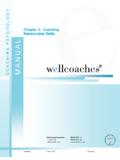Transcription of CHAPTER 2 KIM™S CRITIQUE OF QUINE™S …
1 33 CHAPTER 2 KIM S CRITIQUE OF QUINE S naturalized epistemology Numerous critics of Quine s essay epistemology naturalized treat Quine s proposal to make epistemology a CHAPTER of psychology as a proposal for abandoning normative epistemology (Quine 1969a). One of the most prominent critics making this contention is Jaegwon Kim. Kim objects that by merely describing the causal relationship between cognitive input and output, Quine s naturalism abandons the normative concept of justification, the normative element of the concept of knowledge , and therefore genuine epistemology (Kim 1988).
2 Kim also urges that aside from the concept of justification, even the concept of belief has a normative dimension, and that any epistemology wishing to dispense with normativity must also dispense with belief a seemingly absurd consequence for naturalists who otherwise seem to be enamored of discussing reliable belief-forming processes. There is, however, a serious question as to whether Quine s approach to normativity is a fundamental vulnerability in his position. In later writings, Quine denied that he intended to dispense with normativity (Quine 1986a; 1992).
3 6 Others have explained in detail the resources available to Quine for the purpose of naturalizing epistemic normativity (Sinclair 2004). Beyond the specific domain of Quine scholarship, proposals for naturalizing normativity in terms of special facts about biological or sociological causation abound (Giere 1988; Laudan 1984; Laudan 1990b; Rosenberg 1996; Kornblith 2002). These naturalization proposals are controversial, of course, but their existence demonstrates that one cannot challenge naturalized epistemology simply by assuming an opposition between the causal and the normative.
4 Surely Kim is aware of the possibility that normativity might be naturalized , and although his CRITIQUE is not often remembered as such, it involves more than just the normativity objection. Kim 6 Recent defenders of Quine have also offered explanations for why critics erroneously came to read Quine as rejecting normativity (Johnsen 2005). 34also explores what he takes to be Quine s motivations for naturalizing epistemology in the first place, and argues that they are inadequate. In particular, Kim argues that the failure of traditional deductivist foundationalist epistemology does not, as Quine believes, leave Quinean naturalism as the only alternative.
5 To support this, he points out non-Quinean alternatives to traditional epistemology , a variety of mainly contemporary theories that propose new, non-deductivist conceptions of justification. Insofar as these any of these alternatives is viable, it seems that Quine may have overlooked the third way between tradition and naturalism. The question, then, is whether the alternatives are viable. I would suggest that this question about the viability of non-Quinean alternatives, rather than the normativity issue, is the more fundamental question for naturalism: naturalists have too many tools at their disposals to solve or dissolve the normativity problem.
6 This CHAPTER , therefore, will examine the viability of Kim s alternatives. As it happens, there are distinctively Quinean objections to be registered against each of them. But Kim does not anticipate most of these objections or the power of the distinctively Quinean principles that empower them, principles such as the underdetermination thesis, the indeterminacy thesis, and extensionalism. To demonstrate this, I will begin with a brief review of Quine s arguments in epistemology naturalized . I will then summarize the non-Quinean alternatives to traditional foundationalist epistemology Kim considers, and show how Quine might refute each by reference to his basic principles and methodology.
7 In particular, I will discuss the methodological concept Kim relies on to propose many of his alternatives, the concept of supervenience, and show the same Quinean objections might be applied to it. I will end by examining one likely element of a would-be supervenience base for epistemic properties belief states and raise similar problems. In pointing out Quinean responses to Kim s alternatives, I do not intend to defend Quine to the bitter end or reject Kim. I myself am skeptical about naturalized epistemology , and sympathize with the spirit of Kim s objections.
8 But I think that a fair criticism of Quine must be rendered at the most 35fundamental level. If deep Quinean principles make it difficult to propose alternatives to his epistemology , the only way to challenge his epistemology is to challenge those principles. Understanding this will help to illustrate the deep difference between Quine and his rivals. epistemology naturalized in brief Kim focuses his criticism largely on Quine s essay epistemology naturalized . It is important to note, however, that this essay was merely a summary of a project Quine had already been pursuing for years.
9 As early as Two Dogmas of Empiricism, Quine had sought to undermine the positivist insistence on an analytic/synthetic distinction that had segregated philosophy from science (Quine 1953b). He rejected the distinction, not just because philosophers had not drawn it clearly, but on principled grounds deriving from confirmation holism. According to this view, only blocks of theory as a whole can be confirmed or refuted, so any individual statement can be held true or revised come what may; therefore, analytic statements are not a distinctive type of statement that is confirmed no matter what.
10 With this rejection of analyticity, he held statements of science and statements of mathematics or logic to be on equal epistemological footing. This would presumably also include statements of philosophy and thereby epistemology . In Word and Object (1960, 3), Quine told us that the philosopher and the scientist are in the same boat, and it is it is arguable that Word and Object is his major treatise on the subject of naturalized epistemology . Fast-forward, then, to epistemology naturalized . Quine begins his essay by noting a parallel between mathematics and He notes that traditionally, both mathematicians and epistemologists pursued so-called doctrinal and conceptual projects.
